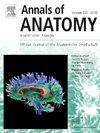Surgical anatomy of the cystic artery: A systematic review with meta-analysis
IF 1.7
3区 医学
Q2 ANATOMY & MORPHOLOGY
引用次数: 0
Abstract
Background
The current evidence-based systematic review with meta-analysis presents a detailed overview of the cystic artery (CA) surgical anatomy, including its origin, number, topography, and morphometry. Moreover, the surgical implications of these variants are further discussed.
Methods
According to the Evidence-Based Anatomy Workgroup and PRISMA 2020 guidelines, the systematic review was performed using four online databases. The Anatomical Quality Assurance Tool was used to evaluate the risk of bias. Meta-analysis was performed with the R programming software. The pooled prevalence and pooled mean of different CA parameters were calculated.
Results
The CA most commonly originated from the right hepatic artery (a pooled prevalence of 85.75 %). Other described origins (in order of frequency) were the aberrant right hepatic artery, the common hepatic, the left hepatic, the gastroduodenal, the superior mesenteric, and the middle hepatic arteries. The CA was single in 88.59 %, while it can be identified as double, triple, or absent. Most commonly, it was located inside the cystohepatic triangle in 83.83 %. Most commonly, it was superomedially to the cystic duct (77.80 %) and posteriorly to the common hepatic duct (35.08 %). The CA pooled mean length was 21.34 mm, and its diameter was more commonly over 1 mm.
Conclusion
The CA surgical anatomy is paramount when operating on the gallbladder. The CA's altered anatomy and adjacent area could lead to confusion, iatrogenic injury, and prolonged surgical time. The CA depicts high morphological variability; therefore, surgeons should consider the typical anatomy and possible (usual and unusual) variants.
囊动脉的手术解剖:系统回顾与荟萃分析。
背景:当前的循证系统综述和荟萃分析详细概述了囊状动脉(CA)的手术解剖,包括其起源、数量、地形和形态。此外,还进一步讨论了这些变异的手术意义:根据循证解剖学工作组和 PRISMA 2020 指南,利用四个在线数据库进行了系统性综述。解剖学质量保证工具用于评估偏倚风险。使用 R 编程软件进行元分析。计算了不同CA参数的集合患病率和集合平均值:结果:CA最常见的来源是肝右动脉(合计发生率为85.75%)。其他描述的起源(按频率排序)为异常右肝动脉、肝总动脉、左肝动脉、胃十二指肠动脉、肠系膜上动脉和肝中动脉。88.59% 的患者为单侧 CA,也有可能是双侧、三侧或无 CA。最常见的是,83.83%的 CA 位于膀胱肝三角内。最常见的是位于膀胱导管的上方(77.80%)和肝总管的后方(35.08%)。CA集合平均长度为21.34毫米,直径通常超过1毫米:结论:在对胆囊进行手术时,CA的手术解剖结构至关重要。结论:在对胆囊进行手术时,CA 的解剖结构是最重要的。CA 的解剖结构和邻近区域的改变可能会导致混乱、先天性损伤和手术时间延长。CA 的形态变化很大,因此,外科医生应考虑典型的解剖结构和可能的(常见的和不常见的)变异。
本文章由计算机程序翻译,如有差异,请以英文原文为准。
求助全文
约1分钟内获得全文
求助全文
来源期刊

Annals of Anatomy-Anatomischer Anzeiger
医学-解剖学与形态学
CiteScore
4.40
自引率
22.70%
发文量
137
审稿时长
33 days
期刊介绍:
Annals of Anatomy publish peer reviewed original articles as well as brief review articles. The journal is open to original papers covering a link between anatomy and areas such as
•molecular biology,
•cell biology
•reproductive biology
•immunobiology
•developmental biology, neurobiology
•embryology as well as
•neuroanatomy
•neuroimmunology
•clinical anatomy
•comparative anatomy
•modern imaging techniques
•evolution, and especially also
•aging
 求助内容:
求助内容: 应助结果提醒方式:
应助结果提醒方式:


